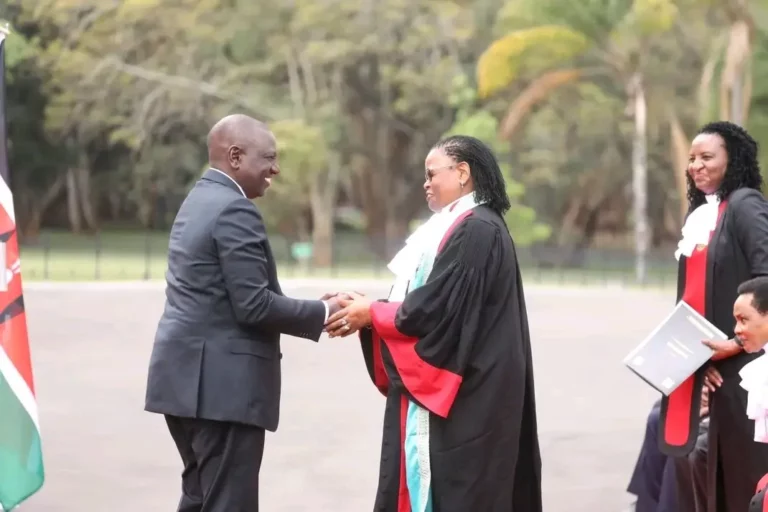 For the judiciary, the start of the year 2024 has been anything but fanciful. What started as a covertly and thinly unveiled threat from President William Ruto in his New Year address quickly morphed into raw, unhinged, and unfiltered threats.
For the judiciary, the start of the year 2024 has been anything but fanciful. What started as a covertly and thinly unveiled threat from President William Ruto in his New Year address quickly morphed into raw, unhinged, and unfiltered threats.
The President has since been consistent and persistent in his desire to defy the Judiciary, ostensibly due to what he terms the latter’s intention to sabotage his development agenda.
Although he claims not to target the institution of the judiciary ‘corrupt elements’ within the judiciary, the full import has not been lost to various stakeholders, some of whom have called him out. The Law Society of Kenya (LSK) has, for instance, set up a legal team to extensively review the president’s constitutional violations.
The context of President Ruto’s sustained attacks is the rulings that are viewed unfavourably, including privatization, universal health coverage, and the housing levy.
Taking a cue from the Executive, Parliament, specifically the National Assembly, has actualized a defiance of its own.
In December 2023, the High Court in Kisumu ordered a halt to the planned public participation in the Affordable Housing Bill following a petition by the Kisumu-based Grassroots Trust. They argued that the time provided by the National Assembly was too short to allow for any meaningful public participation.
The High Court in Vihiga would later uphold the decision by the Kisumu High Court, refusing to vacate the orders and stopping the public participation process. Despite the orders, the National Assembly has insisted on proceeding with the process, expectedly giving its justifications for the defiance. One of the arguments made by the National Assembly, including through its lawyers, is that it should be allowed to undertake its law-making process, and any party dissatisfied can challenge the law after it is passed.
The 2010 Constitution tries its very best to define the functions of each of the three branches of government. Broadly, Parliament makes laws, which the Executive implements. The judiciary, on the other hand, interprets laws. But the Constitution is equally alive to the fact that separation of powers is never absolute and that it is ensconced within the framework of checks and balances.
For instance, whereas Parliament is primarily charged with making laws, the Executive is allowed a window to participate in the process through presidential assent to the passed bills. Moreover, through presidential veto, as provided for under Article 115, the president has the latitude to modify the content of the bill by way of a memorandum detailing his or her reservations. Admittedly, the interpretation of Article 115 is itself contested. Parliament too has its tools that it can use to check the executive, one of which is impeachment. Checks by the other branches of the judiciary include participation in the vetting and appointment of judicial offers.
Fallouts and disagreements are expected. Despite being centuries old, the practical application of the separation of powers doctrine has yet to attain a perfect balance anywhere in jurisdictions practising democracy.
Recently, the Supreme Court in Israel declared unconstitutional sections of the law passed by Israel’s Parliament (Knesset) that sought to weaken the country’s judiciary. The passage of the law triggered protracted public protests last year, only disrupted by the October 7th, 2023, attack by Hamas. In France, disquiet arose last year following President Macron’s decision to bypass the National Assembly to enact the unpopular pension reform bill. A special provision in France’s Constitution, Article 49.3, grants the President powers to pass a bill without a vote by the National Assembly, the lower house.
The beauty of our Constitution is that it provides in-built mechanisms to address any fallouts occasioned by disagreement between and among the three branches of government.
Fortunately, defiance in the manner lately exhibited by the Executive and Parliament is not one of them. Mechanisms for removing corrupt judicial officers are provided. It recently played out in the case of Justice Said Juma Chitembwe.
If our pride as a constitutional democracy is to hold, then fidelity to the rule of law must be viewed less as a question of choice and more as a binding obligation. The potent risk of raw defiance is that it becomes hard to tell where it stops.
Judicial decisions are by their very nature contested, and every dissatisfied party can adduce their justification for defiance.
Defiance equates to the removal of a referee in a game, and so any player can play however they wish. Simply put, anarchy becomes the rule. We must not get there.
Alex Ogutu is a PhD candidate at the University of Nairobi’s Political Science and Public Administration Department. ochiengalex84@gmail.com




